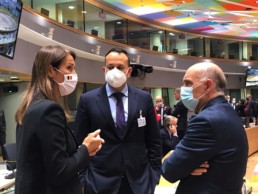Today, Thursday 11 November, Deputy Prime Minister and Minister of Foreign Affairs and Trade Sophie Wilmès and her fellow Ministers met in Brussels for a Foreign Affairs and Trade Council meeting.
WHO
First of all, the Council discussed the prospects for the WHO Ministerial Conference, which will start at the end of this month in Geneva. The success of this Conference is of great importance to this country. The European Union must also take on a strong, leading role, particularly in the now 20-year-long negotiations on fisheries subsidies and the negotiations on Trade and Health, the WHO’s response to the COVID-19 crisis. Belgium’s priority is to reach an agreement on this – an agreement that must be global and comprehensive, i.e. aimed at more than just intellectual property of vaccine licences, but facilitating trade and scaling up production as well.
Sophie Wilmès: “Although the production of vaccines (including in this country) is increasing rapidly, the common goal of global, fair access to COVID-19 vaccines has not yet been reached. It is therefore of great importance that the WHO can best contribute to an efficient and targeted response to this pandemic and to the pandemics of the future. This is essential not only for the health of millions of vulnerable people – and indeed the whole world – but also for the credibility of the WHO, which must be able to demonstrate that it can respond to new challenges.”
Another crucial issue for this country is reforming the WHO. Belgium fully supports the creation of a working group that will focus on reforming the three functions of the organisation, namely negotiation, monitoring and dispute settlement. Sophie Wilmès: “This working group should be able to present the initial results at the next Ministerial Conference. There is now an urgent need to move forward and create a new dynamic within the WHO, which has been facing many internal challenges for years.”
Virtual meeting with US Trade Representative Katherine Tai
That was also the thrust of this country’s message to the US Trade Representative, Katherine Tai, with whom the Council was able to have a virtual exchange of views. Deputy Prime Minister Wilmès reiterated the message she had already conveyed to USTR Tai at the previous three meetings, namely the conviction that better collaboration and coordination between the US and Europe is essential for the WHO, particularly in the context of the pandemic and the economic relaunch, but also beyond. Sophie Wilmès: “This is why we are calling for the active engagement of the US, including on much-needed reform of the WHO, such as unblocking the dispute settlement system, ‘special and differential treatment’ (the regime that allows developing countries to benefit from more flexible trade rules) and creating a better level playing field.”
Trade relations with the US
The Ministers also discussed trade relations with Washington. For this country, the first meeting at a ministerial level of the EU-US Trade and Technology Council (TTC) at the end of September is a positive development. The TTC should further deepen the transatlantic relationship in terms of trade and technology. Belgium anticipates that the activities in the 10 working groups that have been set up (e.g. on semiconductors, artificial intelligence and 5G) will produce results soon.
Sophie Wilmès: “The Trade and Technology Council marks the beginning of a new and positive chapter in our trade relations with the US. Also, after the suspension of import duties in the Airbus-Boeing dispute, the (albeit partial and temporary) suspension of import duties on aluminium and steel is a step in the right direction. It is now essential to find lasting solutions and put our differences of opinion with the United States – one of Belgium’s most important trading partners outside the EU – behind us. Let us continue on the renewed momentum of international collaboration, face the many global challenges together and achieve concrete results.”
EU trade agreements
As regards the Benelux, this country asked the Council to have regard to the review of sustainability agreements in EU trade agreements. For the record: since 2011, the EU’s free trade agreements have always included a chapter on ‘sustainable development’, which includes commitments and a collaboration framework in the field of social and environmental rights.
Sophie Wilmès: “Belgium has high expectations of the review of the sustainability agreements. This country is also calling for an open, inclusive and transparent process, involving the Council at every stage of the review,” said Sophie Wilmès. “New free trade agreements should contain strong provisions on social and environmental standards. Trade remains one of the EU’s most powerful instruments. It contributes to Europe’s prosperity and economic competitiveness and acts as a geostrategic and normative lever. But a balance must be maintained between the need to open up to foreign markets and the need to pursue trade policies that are coherent with our domestic policies, reflecting the challenges of our time and the expectations of our citizens.”
